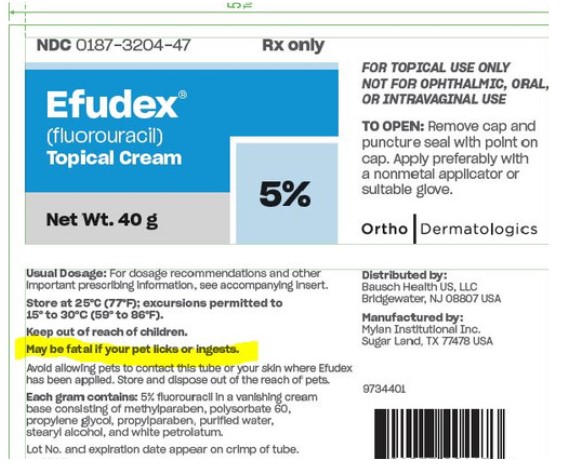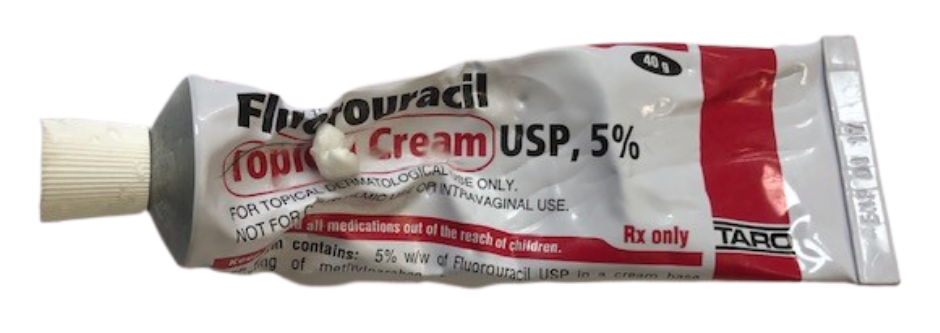After seeing far too many patients over the past 2 decades die from ingestion of the 5-FU ointment, Dr. Eric Glass lobbied the manufacturers, news outlets, physician associations and finally the Food and Drug Administration (FDA) to get appropriate labeling changes to 5-FU. It was announced by the FDA in November 2021, that the product inserts and carton and container labels would contain warnings. This change will inevitably save many animals lives!

For more information regarding 5-FU and it's risks, read on:
The Neurology & Neurosurgery and Critical Care Departments at Red Bank Veterinary Hospital would like to make all pet owners aware of a potential lethal toxicity harming our pets. Each year we see dogs that have, unfortunately, ingested a human chemotherapeutic agent called 5-FU. Fluorouracil, also known as 5-FU, is a human chemotherapeutic ointment used for skin cancers such as superficial basal cell carcinoma, or actinic keratosis. Brand names of 5-FU include Fluoroplex ®, Efudex ® and Carac ®. The ointment is applied to the affected skin, and works by preventing synthesis of proteins in rapidly dividing cells, like tumor cells, which cause death of the cancer.
Unfortunately, most prescribing physicians do not know to warn patients of the risk associated with 5-FU to household pets. Additionally, there is absolutely NO warning on the product packaging to keep the medication out of the reach of pets.

We see ingestion of this medication most commonly in young dogs or puppies that inadvertently chew on the tube containing the ointment.
We have also examined dogs that die from ingestion of 5-FU after simply licking the owner’s skin, which contains the ointment.
5-FU causes a buildup of ammonia in the body, which is harmful to the nervous system. Dogs that have ingested 5-FU will present with an unsteady gait and whole body tremors that rapidly progress to uncontrollable seizures and eventual death.
It is key to understand that even a VERY, VERY small amount of this material can be life threatening to a puppy – usually less than 10% of the tube. A simple sharp puppy tooth is all that is needed to pierce a tube of 5-FU and result in death of beloved household pet. The key is to PREVENT the dogs from ingesting 5-FU in the first place.
In the event your dog ingests 5-FU, or you suspect ingestion, it is paramount that you do the following:
Curious pets have been known to get into things they shouldn’t. Be sure to pet proof your home as much as possible to avoid inadvertent toxin exposure. In general, if you think your pet has ingested any hazardous substances, including home and garden products, human food and medications, poisonous plants, or other harmful objects, please contact your veterinarian, your local veterinary emergency hospital, or the ASPCA’s 24-hour emergency poison hotline at 1-888-426-4435. Keep these phone numbers in a convenient, easy to find place at home. For a comprehensive list of hazards and toxins, visit aspca.org.
Finally, NONE of the manufacturers of 5-FU label the medication as toxic and deadly to household pets. Furthermore, there is no label on the ointment tube or packaging with the ASPCA 24-hour emergency poison hotline. We strongly encourage you to contact the manufacturers of 5-FU to insist that appropriate labeling be included on the ointment tube and packaging. Also, you may want to remind your physician of the potential harm of 5-FU in household pets.
This information is courtesy of:
Eric N. Glass, MS, DVM, DACVIM
Neurology & Neurosurgery Department